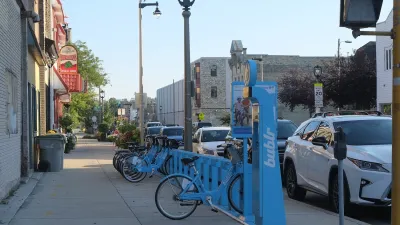A new report sheds light on the income gap in the use of bikeshare systems around the world.
Eric Jaffe delves into the findings of a report by the Mineta Transportation Institute regarding the growth of bikeshare systems in the United States. The report, "Public Bikesharing in North America During a Period of Rapid Expansion: Understanding Business Models, Industry Trends and User Impacts [pdf]," includes data revealing the systemic challenge of delivering bikeshare to low income populations.
After showing some of the income disparities found in systems like those in the Twin Cities, Salt lake City, Toronto, and Mexico City, Jaffe shares a point made in the report: "Many systems don't make much of an effort to place bike-share stations in low-income neighborhoods. Only nine of 21 selected systems interviewed by the report authors said equity factored into station location. The business end of bike-share potentially plays a major role here: Tourist locations tend to generate the most membership and the most revenue..."
Jaffe notes that a new system expected to launch next spring in Philadelphia will deliberately target low income neighborhoods for stations, providing a model of equity-based planning for bikeshare systems around the country (and world).
FULL STORY: Bike-Share Is (Still) Struggling to Reach Poor People Across North America

Alabama: Trump Terminates Settlements for Black Communities Harmed By Raw Sewage
Trump deemed the landmark civil rights agreement “illegal DEI and environmental justice policy.”

Planetizen Federal Action Tracker
A weekly monitor of how Trump’s orders and actions are impacting planners and planning in America.

The 120 Year Old Tiny Home Villages That Sheltered San Francisco’s Earthquake Refugees
More than a century ago, San Francisco mobilized to house thousands of residents displaced by the 1906 earthquake. Could their strategy offer a model for the present?

In Both Crashes and Crime, Public Transportation is Far Safer than Driving
Contrary to popular assumptions, public transportation has far lower crash and crime rates than automobile travel. For safer communities, improve and encourage transit travel.

Report: Zoning Reforms Should Complement Nashville’s Ambitious Transit Plan
Without reform, restrictive zoning codes will limit the impact of the city’s planned transit expansion and could exclude some of the residents who depend on transit the most.

Judge Orders Release of Frozen IRA, IIJA Funding
The decision is a victory for environmental groups who charged that freezing funds for critical infrastructure and disaster response programs caused “real and irreparable harm” to communities.
Urban Design for Planners 1: Software Tools
This six-course series explores essential urban design concepts using open source software and equips planners with the tools they need to participate fully in the urban design process.
Planning for Universal Design
Learn the tools for implementing Universal Design in planning regulations.
Clanton & Associates, Inc.
Jessamine County Fiscal Court
Institute for Housing and Urban Development Studies (IHS)
City of Grandview
Harvard GSD Executive Education
Toledo-Lucas County Plan Commissions
Salt Lake City
NYU Wagner Graduate School of Public Service




























